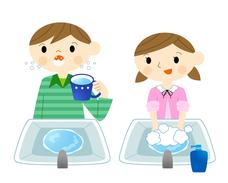Prevention of infections
Author: Dipl.-Biol. Maria Yiallouros, Gesche Tallen, MD, PhD, Editor: PD Dr. med. Gesche Tallen, English Translation: Hannah McRae, Last modification: 2014/05/26 https://kinderkrebsinfo.de/doi/e121680
General considerations
A patient with an increased risk of infection, particularly during times of neutropenia, and his or her family will be notified of this situation by the caregiver team and informed about the potential complications and how to prevent them. However, even if thorough precautions are followed, an infection can not always be avoided.
The risk of infection increases when being in close physical contact with other people or pets, or playing outside in the dirt, getting hurt by a plant, or even after eating fruits and raw vegetables. Therefore, it is crucial to keep an immunocompromised cancer patient away from people who are known to have a contagious disease or have recently been vaccinated (with life vaccines).
Maintaining certain hygiene habits such as regular hand washing, mouth care with disinfectant solutions, avoiding toothbrushes with hard bristles, and not cutting nails helps to prevent infection. The patient's skin should always be kept moisturized, since dry skin provides easier entry for pathogens. Potted plants should be avoided inside the home as well as the consumption of nuts, as they may be contaminated by fungi and fungal spores.
Indwelling venous catheters (for example a Broviac or Hickman catheter) require a specific hygienic routine which will be taught in detail by the caregiver team after insertion of the device. Overall, the potential infectious complications vary depending on the individual disease-associated conditions and treatment intensity. Therefore, certain, very strict precautions are only required during certain phases of intense treatment [SIM2001b].
Antibiotics for prevention of bacterial, viral and fungal infections (antibiotic prophylaxis)
Certain pathogens are particularly dangerous for immunocompromised patients. These include, for example, the microorganism Pneumocystis jiroveci (also known as Pneumocystis carinii), which causes a chronic form of pneumonia that is hard to control. The measles, chickenpox and herpes viruses, as well as fungi like mould can also cause fatal complications. A lot of infectious agents are usually harmless for the healthy population but require treatment in cancer patients.
In order to prevent an infection with Pneumocystis jiroveci in children and teenagers with cancer, they are usually given an antibiotic called co-trimoxazole (trimethoprim-sulfamethoxazole, or TMP-SMZ) three times a week on consecutive days, including weekends. This medication is taken as a liquid that is brushed onto the oral mucosa while doing mouth care. If the patient does not tolerate this medication well, other options are available (such as pentamidine inhalation). Co-trimoxazole-intolerance is usually caused by the carrier attached to the antibiotic rather than by the antibiotic itself. Hence, taking a different preparation of the compound usually solves the problem.
Prophylactic antibiotic treatment is also given in order to prevent fungal infections, such as Candida or mould (for example with amphotericin B suspension), particularly in times of neutropenia or during certain phases of intensive anticancer therapy (induction and reinduction). Besides taking antibiotics, the patient should avoid playing in the dirt outside. Also, renovations should by no means be performed in a cancer patient's home, since such measures are frequently associated with mould exposure, thus a considerable risk of fungal infection in immunocompromised patients.
Precautions must also be taken to keep the risk of viral infections as low as possible. Therefore, it is strongly recommended that immunocompromised patients do not come into contact with people who are in a contagious stage or sick with chickenpox or shingles (varicella zoster), because infections with these viruses cause fatal health problems for children with cancer. In case a patient gets accidently in contact with someone who is contagious or sick, she or he may be given antiviral drugs (such as aciclovir) to prevent complications.
Patients infected with herpes simplex virus, for example presenting with cold sores, are often given antiviral treatment, too [GRA2001] [GRA2001a] [GRO2001] [GRO2001a] [SIM2001].
Patients undergoing radiotherapy of the spleen should be vaccinated against certain bacteria (such as Pneumococcus and Meningococcus) after therapy. Under certain circumstances, these patients are also recommended to additionally take prophylactic antibiotics (such as penicillin) during and after radiotherapy.



